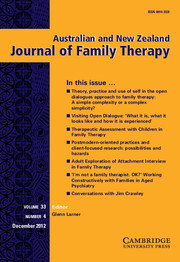Article contents
Differentiation of Self and the Process of Forgiveness: A Clinical Perspective for Couple and Family Therapy
Published online by Cambridge University Press: 21 February 2012
Abstract
In this article we explore the role of differentiation of self in facilitating forgiveness in the context of couple and family relationships. Differentiation is defined from the Bowen perspective as the ability to connect with others without being excessively emotionally reactive to the ebb and flow inherent in all significant relationships (being able to connect to others yet also being able to self-regulate). Forgiveness is described as the releasing of an emotional injury via a complex psychological and relational process that is less an act of will than a discovery or possibility through understanding and empathy. Differentiation of self is related to emotional intelligence and empathy. The developmental and relational benefits of such are illustrated and discussed. A rationale for viewing differentiation and forgiveness in a contextual, historical, and relational attachment paradigm is suggested. Relevant clinical cases illustrate the dynamics of differentiation and forgiveness as discovery in the context of an understanding and empathic relational environment.
Keywords
- Type
- Articles
- Information
- Australian and New Zealand Journal of Family Therapy , Volume 32 , Issue 1 , 01 March 2011 , pp. 43 - 57
- Copyright
- Copyright © Cambridge University Press 2011
- 11
- Cited by


